Behind the Scenes of Antony and Cleopatra With Stage Manager Jessica Barker
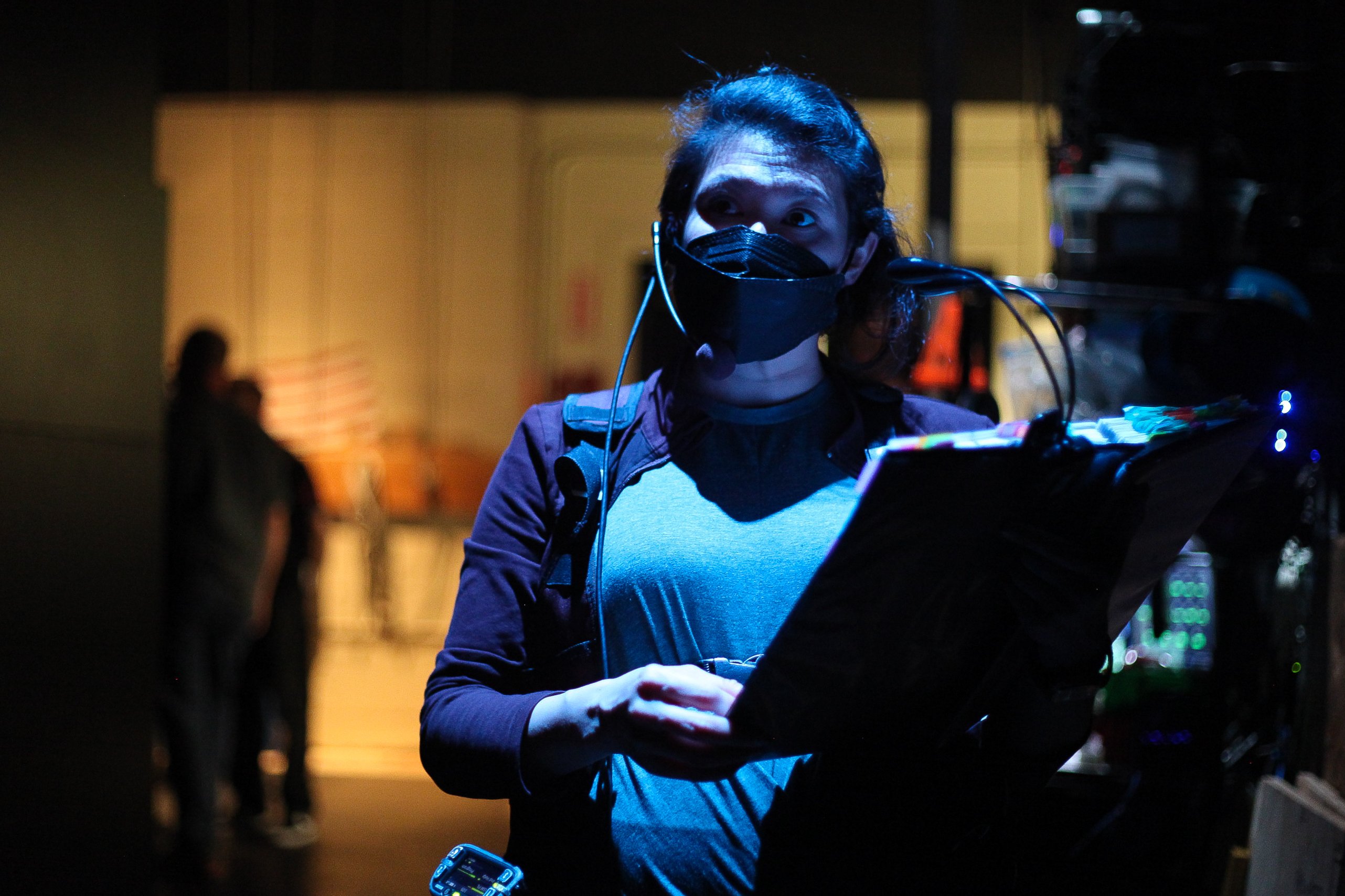
One of four assistant stage managers working on Antony and Cleopatra, Barker works to ensure every cue is met, every mark is hit. But with a world premiere like Antony and Cleopatra, the stakes are high. Every aspect of the production is new and untested.
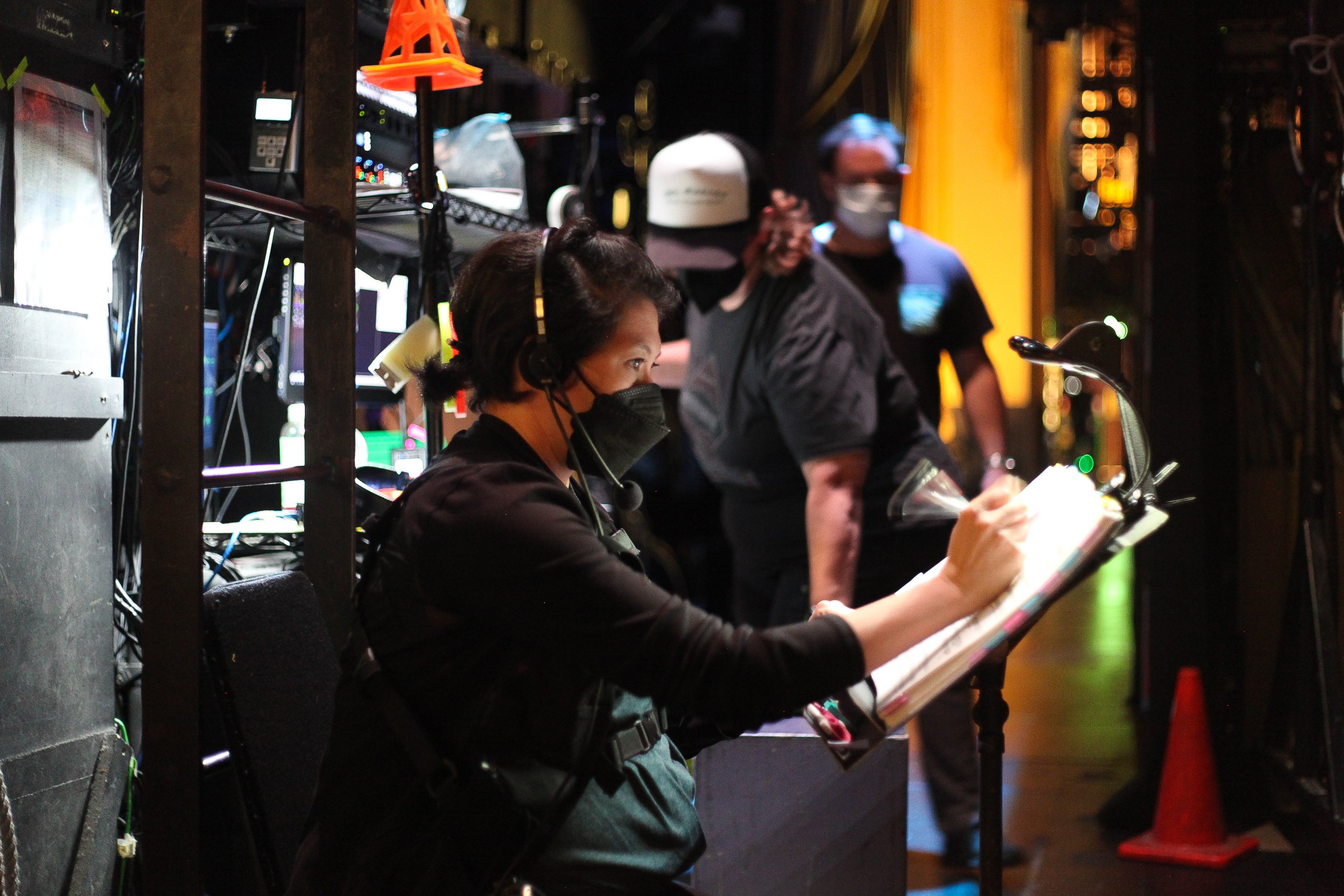
“We are creating it as we go,” Barker explains. But she relishes the challenge, a rare opportunity to mount a spectacle that’s completely original.
“There aren't a lot of companies that can take the risks of mounting new productions, that can invest their time, energy and money in the creation of new works. And I think it's this creation aspect that keeps our art form—opera and live performances in general—evolving and ever-changing and fresh and new.”
Originally from Saint Charles, a Missouri suburb north of St. Louis, Barker fell in love with high-school theater—and specifically costuming. But as she pursued a bachelor’s, then a master’s, in theater studies, she found a niche in stage management.
“Working together as a big team to put on something bigger than ourselves was always appealing to me,” Barker says.
Stage managers ensure a production runs smoothly, serving as a kind of air traffic control for the comings and goings on stage—and off. So it helps to have a broad range of experiences to understand all the moving parts that make a theater run.
Barker herself has a musical background. As a young child, around age 5, she taught herself to play the piano, using books her mother brought home for her.
“We didn’t have a lot of money growing up, but I had this little keyboard and would tinker at it,” she says. Eventually, as she reached her 10th birthday, her parents saved up to put her through lessons.
Her love of music only grew as time went on. She sang in a competition show choir in high school and even received special permission to take music theory classes in graduate school.
“Music was a big part of my love for opera,” she explains. To this day, she draws on that knowledge for her work: San Francisco Opera’s stage managers refer directly to the musical score when prompting a show, often carrying an open copy in their hands.
And it was through costuming that Barker got her first exposure to large-scale opera. As a young artist, she took an apprentice position at Santa Fe Opera, working alongside their wardrobe crew and later joining the tailoring team as a stitcher.
At Santa Fe Opera, Barker was able to observe all the “moving pieces” that go into opera: from the orchestra to the lighting to the costumes and sets. It was a whirlwind, a machine with infinite parts. Barker was hooked.
She joined San Francisco Opera in 2018, just as the company was embarking on a massive summer production of Richard Wagner’s four-part saga The Ring of the Nibelung.
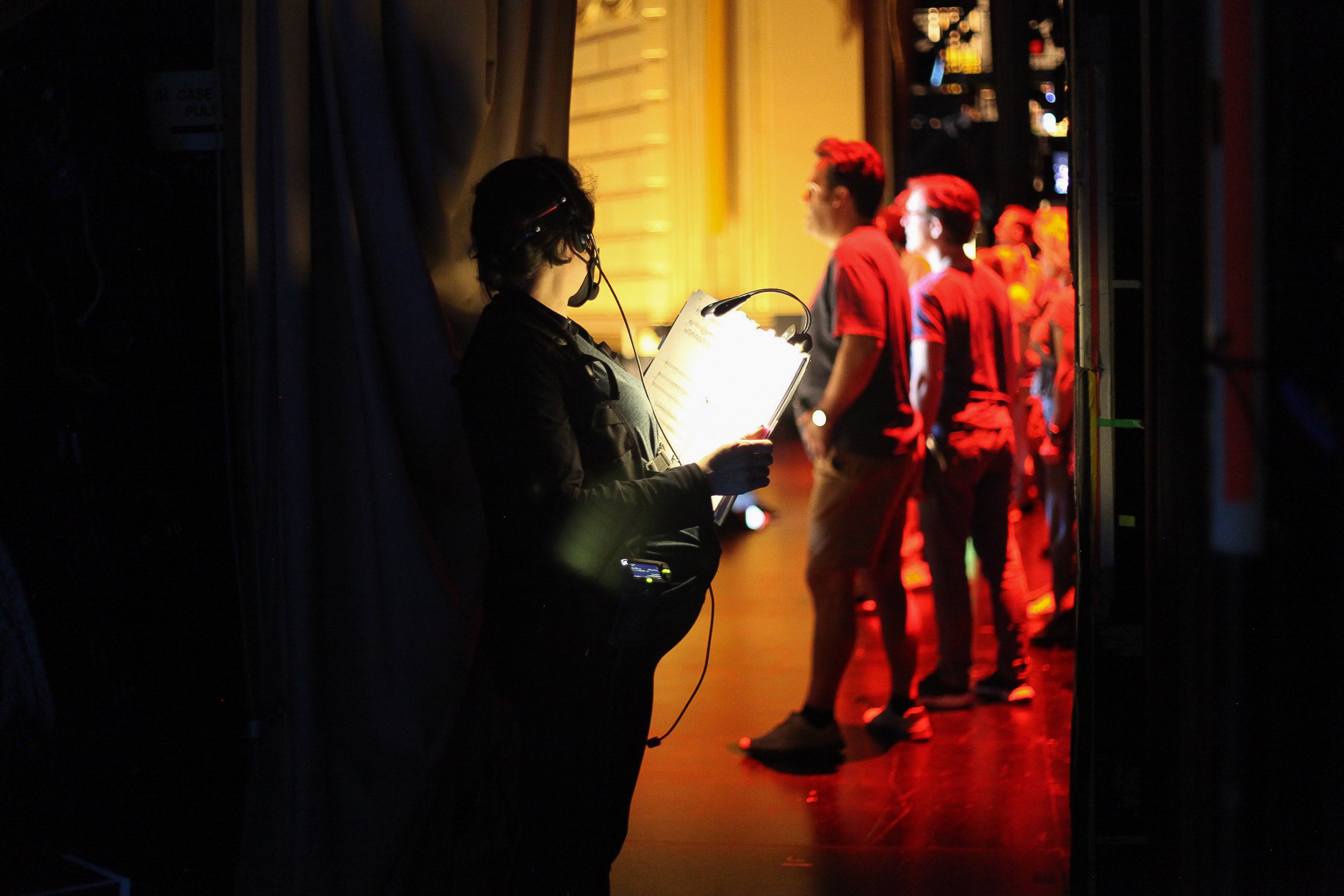
“My passion is challenging shows,” she laughs. “That’s what I do. I jump around to find the most challenging things I can.”
And Antony and Cleopatra, she laughs, certainly ranks among the most challenging. And it comes on the heels of the hardest show of her career: Harry Potter and the Cursed Child, a show filled with pyrotechnics and acrobatics. It closed its San Francisco run the same weekend that Antony and Cleopatra opened.
Add to that the fact that Barker is eight-and-a-half months pregnant with her second child. But Barker exudes a supernatural calm.
“I think I’m a little less stressed because it’s not my first pregnancy,” she shrugs. Her first child arrived in 2020, during the pandemic-related theater shutdown.
To balance the unpredictabilities of pregnancy with the exacting pressures of stage management, Barker keeps meticulous notes in her copy of the score, so that her colleagues can step in to replace her at any time.
Antony and Cleopatra’s all-female team of assistant stage managers has also reassigned roles so that Barker, for instance, would not have to run up and down stars to deliver cues.
The demands of live theater, after all, can test a stage manager’s athleticism. Barker points to the 2019 production of Rusalka as a prime example.
The opera told the story of a water nymph who—like the Little Mermaid—longed to be human so she could live alongside the prince she loved. It was an effects-heavy show, with clouds of fog rolling across the stage to disguise the constant opening and closing of trap doors.
Rusalka floats up from one of these trap doors, wearing a diaphanous gown with a long flowing train. That train was the subject of great scrutiny. If the stage managers closed the trap door too quickly, they risked snagging the train—and pinning the star soprano to the middle of the stage. But if they waited too long, the open chute, hidden in the fog, would be a safety hazard.
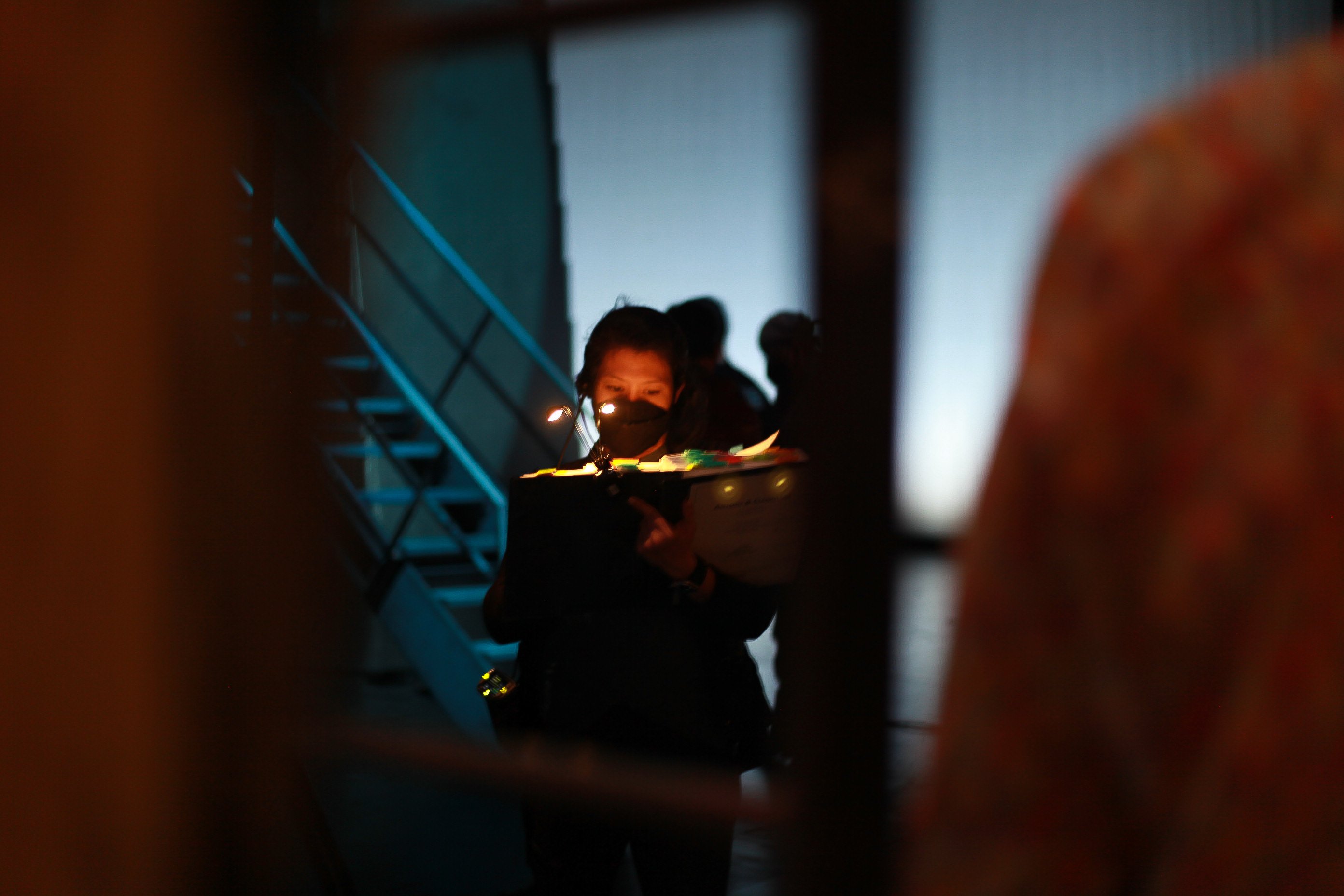
“We were constantly crouching in funny positions, trying to see if the skirt was clear,” Barker recalls. One stage manager had to fold themselves into a tiny nook in a wall on the set, just to ensure the trap door closed safely. “If the audience really knew, they could see you.”
For Antony and Cleopatra, the hurdles are manifold. The giant, monolithic set—which shifts and moves according to the scene—couldn’t fit into the rehearsal space, for starters. That meant stage managers had to wait until the production arrived on stage at the War Memorial Opera House to troubleshoot any issues with the set’s movements.
Then there was the music itself. Barker professes to be a big fan of John Adams’s work—she says she fell in love with his style while working on Fearful Symmetries at San Francisco Ballet—but even she admits that his rhythms can be tough to time.
“He has a syncopation style that has a lot of time-signature changes in the music,” Barker explains.
And in condensing an 42-scene Shakespeare play, Antony and Cleopatra bounces across space and time. One scene might take place in Alexandria, the next in Rome. That means a lot of costume changes, especially for the title characters.
“The last performance, somebody arrived to their quick-change location, and the door was locked,” Barker chuckles.
She points out that bass-baritone Gerald Finley, who plays the Roman general Mark Antony, has one of the toughest costume-change regimens. Toward the end of the first act, he has to quickly slip out of a crisp military uniform and into an extravagant golden robe and headdress, with seconds to spare.
“It takes a village to make those [costume] changes happen,” Barker explains.
But for all the demands of live performance, Barker is still in love with the magic of theater. “At the heart of it, basically I play make-believe for a living,” she says.
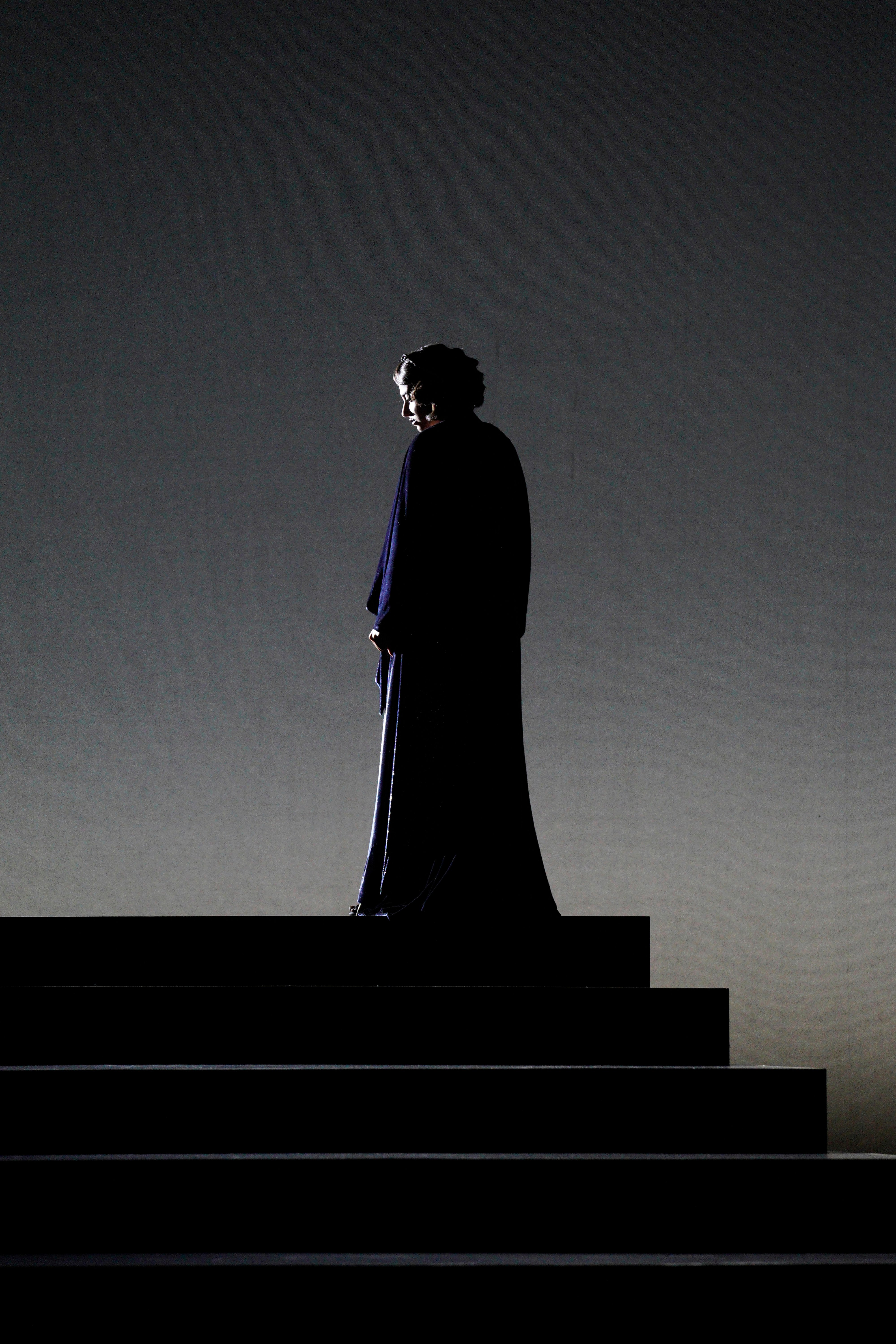
One of her favorite parts of Antony and Cleopatra is a secret hidden to most audience members. The towering set pieces that float across the stage are not powered by motors and machines. Rather, there are teams of stage workers positioned inside each one, ready to move the heavy units through strength alone.
“They’re like in a Fred Flintstone car. It’s just a bunch of guys inside pushing,” Barker explains.
She finds the effect enchanting. “There is this beautiful moment after Eros’s death, where the staircase unit that they’re on, it breaks apart. And the piece he died on drifts away slowly. We call it the iceberg moment” she explains. “It feels almost musical. And it is just a guy inside of the staircase that has just been waiting. He quietly crawls the staircase off.”
Every night, the experience is different. Barker notices new nuances in the performers’ movements, hears new sounds in the opera’s music. It feeds a passion she’s tended since childhood.
“I think that music transcends languages for me,” she says. “And the ability to tell an emotional story with music is something that just really speaks to my soul.”
It can feel like falling in love, she adds. Only, she gets to do it over and over again, night after night, every performance an opportunity to rediscover the spark.
Check out assistant stage manager Jessica Barker’s work in Antony and Cleopatra, closing October 5, 2022.

